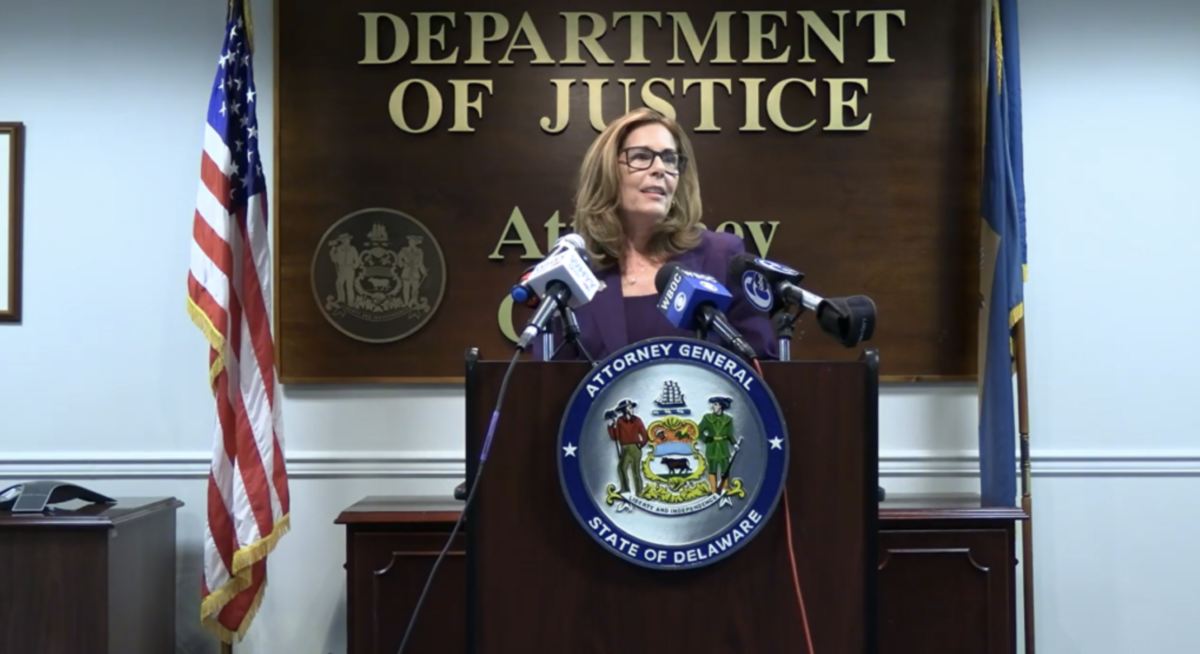Is the Delaware Department of Justice keeping secret files on activists that should be subject to open records requests, but are not? That’s what one New Castle County-based activist alleged in an appeal against a DOJ decision with support from the ACLU of Delaware.
According to Kristina Kelly, the Wilmington Police and the DOJ conspired to retaliate against her because she publicly criticized Attorney General Kathy Jennings and other DOJ employees, including organized picketing and the use of megaphones at the homes of DOJ employees. On August 21, the ACLU appealed a denied Freedom of Information Act request, which sought to receive communications between the DOJ and the Wilmington Police Department to prove alleged retaliation toward Kelly for past protest activity.
One of these instances resulted in a 2021 lawsuit in which the attorney general sued Kelly and a fellow activist, Keandra McDole, for protesting outside the home of Deputy Attorney General Mark Denney. According to documents filed in the Superior Court of Delaware, the lawsuit resulted in a settlement on conditions including that the two activists would not “remain standing in front of any single home in a residential area” and would notify the DOJ 24 hours in advance of any “residential public protests regarding justice for Lymond Moses.”
Moses was a 30-year-old Black man who was shot and killed by New Castle County police officers in 2021. A report by the attorney general’s office in the same year stated that the officers’ actions were justified.
Four years later, Kelly planned to attend an ACLU town hall with the attorney general on June 3. Although she did not ultimately attend the event, Kelly was informed by attendees that Wilmington police were present in case she arrived and caused a disruption, according to the appeal notice. Kelly had posted on Facebook her inability to go to the event, along with a May 28 post saying, “So let’s just ignore that she’s [Jennings] sued protestors. That she’s criminally CHARGED people exercising their first amendment rights.”
According to Joe Connor, another New Castle County-based activist, he did not personally overhear the police talking about Kelly, but said with the large police presence and her Facebook posts, one could “put two and two together.” Connor said he arrived twenty minutes before the event and remembered seeing at least four police officers outside the First & Central Presbyterian Church in Wilmington, where the town hall took place. At a table inside, Connor overheard one officer say they were ordered by the attorney general to come and make sure there was not a disturbance. Once inside the church, he recalls five or six more officers.
“It was just overkill,” he said.
Upon being made aware of the police presence at the town hall event, Kelly filed a FOIA request to see if there was any communication regarding her or the town hall between Wilmington Police and the DOJ.
Andrew Bernstein, Kelly’s attorney with the ACLU, said the DOJ did not provide a clear explanation for the denial of Kelly’s FOIA request. In the denial letter, the state claimed the records she sought “would be attorney-client privileged communication, attorney work product materials, or records pertaining to pending or potential litigation.” Bernstein said that Kelly is not aware of any pending litigation.
Delaware FOIA law states that a reason for the denial must be indicated and that, in the case of legal action, the burden of proof is on the “custodian” or manager of records “to justify the denial of access to records.”
When asked if he thinks the DOJ denied Kelly’s request because of her history with them, Bernstein said that it is possible.
“The fact that it is possible is concerning enough,” he said in an interview with Delaware Call. “FOIA is not supposed to take into account the individual who is making the request or their motive. If it did, then not everyone would have equal access to information that is public. That belongs to all of us.”
The Department of Justice did not respond to a request for comment.
Bernstein said that his end goal with the appeal is to see the requested communications and “shine a light on the need for government agencies to be more transparent in how they evaluate FOIA petitions,” adding he hopes there is no retaliation against First Amendment-protected speech.
(Ed. Note: The ACLU of Delaware is also representing the Delaware Call in a pending FOIA lawsuit regarding Delaware State Police records.)

